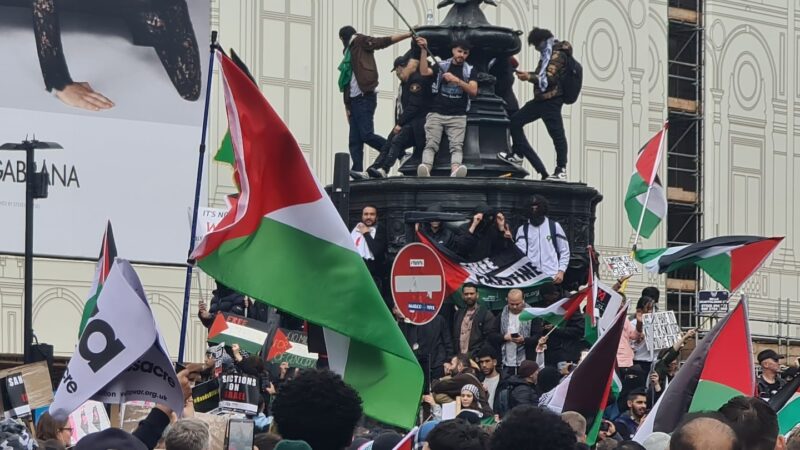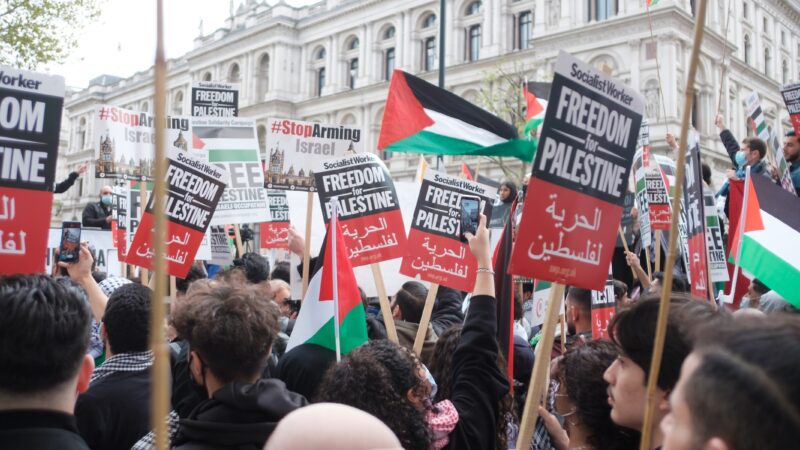With Friends Like These…
“We have no eternal allies, and we have no perpetual enemies. Our interests are eternal and perpetual, and those interests it is our duty to follow.”
Lord Palmerston’s famous adage is typically divorced from its context, especially when used in discussions regarding Britain’s foreign policy, or lack thereof. Delivered as part of a speech in the House of Commons in 1848, the then Foreign Secretary was responding to an argument put forward by one of his most consistent and outspoken opponents, Thomas Anstey, Irish Confederate MP for Youghal.
Over a decade after Poland’s incorporation into the Russian Empire, Anstey maintained intervention in support of the rebels, seeking to establish an independent Polish state, was both a feasible operation and a moral imperative which the government of the day – especially Palmerston, who was still foreign secretary during this period – absconded in favour of non-interference, despite previous suggestions to the contrary. According to Anstey, this amounted to, among other things, a betrayal of Poland and, by extension, their sympathetic ideals.
Accounting for the particular circumstances in which Palmerston was operating, primarily seeking a basic balance of power across the continent, maintaining a preference for less-absolutist models of government without a frothing desire to see them imposed at the drop of a hat, the essence of his shrewd foreign policy stems from the realisation there is no equivalence between interpersonal and international relations, due to the second-order consequences which come with maintaining such agreements:
“…When we are asked why the British Government have not enforced treaty rights in every case, my answer is, that the only method of enforcing them would have been by methods of hostility; and that I do not think those questions were questions of sufficient magnitude in their bearing on the interests of England, to justify any Government in calling on the people of this country to encounter the burdens and hazards of war for the purpose of maintaining those opinions.”
“It does not follow, when a Minister announces in Parliament an intention to perform a public act, that it is to be considered like a promise made to an individual, or by one private man to another, and that it is to be made a reproach to him if the intention be not carried out.”
Indeed, the maintenance of certain opinions under specific circumstances simply isn’t worth it. The opinions we value, whether written in parchment or spoken over the airwaves, and what we are prepared to do to maintain them, form the essence of our political loyalty. Unfortunately for many in Britain’s political class, even its nominally right-wing constituents, their political loyalty seems to lie with Israel. Berating any criticism or lack of enthusiasm as an act of betrayal, the British people are expected to view their interests as secondary to the interests of the Israeli government, all else being unthinkable.
However, much to their aggravation, Britain’s cooling support for Israel has only accelerated these past few days after a convoy of three vehicles, each displaying the World Central Kitchen (WCK) logo, was attacked whilst returning from a humanitarian mission to Gaza through a deconflicted zone; a route agreed with the knowledge and consent of the Israel Defence Forces (IDF). The affected British nationals were working as private military contractors tasked with protecting the convoy and providing medical support. By all estimations, not exactly frothing Hamas-adjacent anti-semites motivated by Islamism or Palestinian nationalism. Worse still, the convoy contacted the IDF after the first vehicle was hit, but to no self-preserving avail.
Of course, this isn’t the first time Israelis has taken liberty with the lives of British nationals, although it’s perhaps the first instance in which the disregard of the Israeli government and its supporters has been made so blatant. The IDF’s chief of staff released a less-than-sincere-sounding apology, claiming the attack was an accident, which chef José Andrés, WCK’s director and co-founder, evidently didn’t find convincing, noting the attack took place over considerable distance, never mind in an area tightly controlled by the IDF.
Benjamin Netanyahu responded in a similar vein, stating occasional civilian casualties were part-and-parcel of war and the overarching mission to keep Israel safe. Whilst not technically untrue, it’s also part-and-parcel – even if not an iron law of reality – for states to alter their relations in accordance with their interests, often in unexpected ways; those who are allies one day are rivals the next. As such, I’m sure Netanyahu would be very understanding if Britain ceased all arms exports to Israel, especially if we had a few security concerns, so to speak.
The Israeli government’s sense of entitlement when it comes to Western support is hard to ignore. David Mencer, Israeli government spokesman and former director of Labour Friends of Israel, affectively stated Britain was obliged to continue supporting Israel as doing otherwise would constitute a betrayal of liberal democratic values. In Mencer’s own words: “You’ve got to take our side.”
Indeed, Britain had great sympathy for the Israelis following the attack on October 7th and a military response from Israel was thought to be expected and justified. It is essentially different to claim Britain has a moral and political responsibility to secure the existence of the Israeli state from its enemies, whatever that entails. In any case, this whole debacle suggests two things about Israel, both of which should inform the UK’s future relationship. Either Israel is too incompetent to be considered a reliable ally or too malicious to be considered an ally at all.
However, despite growing suspicion, mainstream criticism of the Israeli government and its agencies has yet to attach itself to the national interest or any loosely-related concept. Sir Alan Duncan’s comments on “pro-Israel extremism” at the highest echelons of government, citing the conduct of various ministers and politicians, resulted in accusations of anti-semitism and a near-immediate disciplinary inquiry from the Conservative Party. At first glance, this looks like one of several increasingly confident pockets of dissent at the heart of the establishment. In reality, it’s the more puritanical believers in the liberal rules-based international order pointing out the internal contradictions of the status quo.
The likes of Lord Dave and Sir Alan aren’t posturing against Israel out of ‘realpolitik’; they aren’t aligning against the Israeli government for nationalist reasons, but for internationalist ones. In their mind, Britain should distance itself from Israel for the sake of conforming to international law to a greater extent than it already does; it has very little to do with a state being so entwined with a foreign government that it can barely condemn attacks on its own citizens, undermining the most basic interest of any modern state: the protection of its people.
At bottom-level, their understanding is an extension of their bizarre idea of domestic affairs. Parliament amending and breaking the law are one in the same; as an entity, law is stagnant and cannot be ‘constitutionally’ changed, at least not to any political degree. Likewise, the breaking of treaties, for whatever reason, is a violation of international law and therefore necessarily bad. Alas, just as men must tear muscle to build more to gain bodily strength, states must tear laws and treaties to create new ones to gain political strength, at home and abroad.
This line of thought is straightforward and popular enough. In fact, it may explain some of the strongest support for Israel among certain sections of the public; older, Conservative and Reform-voting types with the Union Jack and the Star of David in their Twitter bio.
Accounting for the obvious fact many use support for Israel as proxy for domestic concerns pertaining to the rapid growth of Britain’s Muslim population, doubling as an implicit anti-racist credential by aligning with a historically-persecuted minority group, I suspect a considerable amount of Israelophilia among Britain’s old can be attributed to Mossad’s response to the 1972 Munich Massacre; a 20-year global hunt for Black September soberly titled Operation Wrath of God. Their first impression of Israel, as portrayed by a sensationalist mass-media machine at the height of an international event, is that of a rabidly nationalist state which spares no expense when it comes to pursuing its goal and eradicating its enemies.
The fact Israel didn’t catch the main culprit of the massacre is of secondary importance, what matters is the will and perception of the Israelis was evidently more attractive than whatever the British state was doing. At this time, Britain was enduring some of the worst years of its post-war history, encumbered with economic stagnation, social unrest, and an impotent political class with no perceivable willpower or solution. Sound familiar? As many will recall, similar flickers of admiration were visible following the early response of Israel to the October 7th attack, reigniting a love for a certain determination which our own foreign policy lacks.
Of course, this only accounts for the inclinations of a broadly defined, misguided but well-intentioned demographic of everymen. The political fetishism of Israel among Britain’s centre-right commentariat and policymakers (literal fetishism in some cases) defies any comparable justification. Outside of building the largest possible electoral coalition against Islamism, it seems to be a bizarre fixation.
In short, condemning the actions of Israel committed against our country may feel like a condemnation of the type of politics many of us desire, but it isn’t. As a matter of fact, the opposite is true: it is one of many steps required towards the realisation of a sovereign, self-interested foreign policy.
Palmerston was right, there is no fundamental equivalence between interpersonal and international relations, but there is one similarity worth remembering: trust is the basis of all relations. We trust based on our perceptions of others, our experiences with them and others like them; we make informed guesses, leaps in the dark, as to whether or not we should make ourselves open and vulnerable for the purposes of co-operation and friendship. If our knowledge of another changes, it impacts our ability to trust them. Sometimes this strengthens trust, sometimes it weakens it, and if trust is weakened to such an extent, whether chipped away by routine transgressions or destroyed outright by a single, deeply callous act, one is forced to reconsider their relations.
This is true of both people and states, and following the most severe form of disregard from our so-called ally, after all we felt and done for them, without expectation of reimbursement or lavish praise, it is time we reconsider our relationship with Israel; not towards Palestine, but to our own, independent national interest. They haven’t allowed our co-operation and friendship to disrupt the pursuit of their perpetual interests, it’s about time we do the same.








With Friends Like These, Who Needs Enemies?
Several months have passed since Hamas orchestrated the surprise attacks against Israel in the notorious and brutal events of October 7th, one of the bloodiest days in Israel’s modern history, with over a thousand people killed or kidnapped by Hamas – consequently launching the war in Gaza, and the prolonged campaign of Netenyahu’s government against Hamas and its supporters.
Needless to say, the Israeli response to such an outrageous and devastating attack against civilians has been swift. Combined strategic responses of aerial bombardments, drone strikes, and ground forces swelling into Gaza have been unrelenting, like a jackhammer.
Since October 7th, and the resulting war that followed, social media has erupted with images and videos coming out of Gaza detailing the quite dire humanitarian crisis currently occurring. It’s hard to estimate how many civilians have been killed during the war, but it is likely within the tens of thousands, with more and more adding to the body count as each day passes.
The position of Gaza has also made the situation even more difficult to control, as civilian aid is becoming harder and harder to access through narrow strategic corridors and lack of proper organization and distribution. Vital resources like food, water, and medicine aren’t ending up in the hands of the people that need it the most – if the bombs and the bullets don’t kill the people on the ground, the lack of resources will.
The shock and fury felt across the world after being confronted with this crisis has become a key issue in the West, with countless organized protests at universities and in the streets of capital cities, all demanding that Western nations stop funding the Israelis as they continue their military campaign in the heart of Gaza. This pro-Palestine movement, which is quite broadly supported by those with left-leaning ideologies and intersectionalists, has become an impressive political bloc – especially since it is an election year for both Great Britain and the United States.
Which is frankly quite funny, as most of the people in the pro-Palestine camp, chanting the mantras and songs of Hamas would be shunned by the very same groups they feel the need to protect. In fact, many already have.
Meanwhile, especially amongst “Christian conservatives” in the media and online, there has seemingly been a blank check of support given towards Israel – especially Netenyahu and his Likud government.
After all, Hamas is a terrorist organization, and anything that stops Islamic fundamentalist terror is worth supporting, right? We simply have a moral duty to support Israel, regardless of how blatantly horrific the situation is on the ground. Tax dollars and civilian casualties are a small price to pay for FREEDOM and the protection of “Judeo-Christian” values.
It’s exhausting, but no matter which way you look at it, this will be a defining political issue for the next decade, if not even longer.
And, as always, instead of being able to approach the issue with any level of nuance or recognition that both sides in this conflict seem to be as equally awful and hostile to us as they are to each other, we will once again be put into this binary choice of being “with” or “against” either side. The arguments will be circular, and the cycle of destruction will continue while only a handful of people end up benefiting – mainly weapons contractors and political donor groups.
Before I jump into the beef of this piece, I want to express my outright condemnation of terrorism and terror groups. I feel as if I am obliged – although I think it’s entirely self-evident – to say this, because undoubtedly there will be those who take what I have to say next as an endorsement of Hamas or other fundamentalist Islamic radicals in their war against the State of Israel.
It isn’t. Read the last two paragraphs again if you are confused about where I stand on this issue.
So now that terrorism has been condemned, let’s continue to condemn and reevaluate our unconditional alliance with Israel; because frankly their accusations against Hamas and Palestine is a case of the pot calling the kettle black.
Don’t believe me? I doubt many have had the chance to delve deep into this issue, so let’s start with a little history lesson, shall we?
To understand the Israel of today, you don’t just go back to the partition of Palestine and founding of the State of Israel in 1947, you have to go back a little further in the century, back when the land we now know as Israel was a part of the Ottoman Empire.
Back at the start of the 20th century, when the world was rapidly changing, and revolutionary attitudes were spreading like wildfires, small groups of militias and rebels were beginning to emerge in Palestine.
“In fire and blood did Judea fall; in blood and fire Judea shall rise” was the motto of the group known as Bar-Giora (later “Hashomer”).
Originally this paramilitary organization’s goal was to defend Jewish settlements in the Ottoman Empire from attacks by local Arab populations.
Seems noble enough at first glance, and perhaps it was in intention, but this paramilitary organization, which was led by young, often Marxist-aligned rebels, did not just intend to play defense, but rather grow strong enough and large enough that they could create an effective offense against their Arab neighbors. And judging by their slogan, one can piece together that they weren’t exactly willing to compromise or negotiate peacefully in order to fulfill their goals of establishing permanent Jewish settlements in the region.
After World War One, as the British took control of Palestine, thus leading many members of Bar-Giora/Hashomer to join the Jewish Legion of the British Army in Palestine, as well as assuming positions in the local, British-backed law enforcement.
During the Arab riots of 1920-21, many Jewish settlements and Palestinian Jews suffered attacks at the hands of Palestinian Muslims. Believing that the British were unwilling, or unable, to confront the Muslim majority, these now formally-trained soldiers splintered off and founded “Haganah”.
Haganah went from being a rather unorganized militia to a funded, armed, and large underground army within a matter of years, and would serve as the foundation for what we see as the IDF today.
Again, while noble in intentions – to protect Jewish settlements – you’re only as good as the bad apples in the basket. It didn’t take long for splinter groups to form out of Haganah, namely Irgun, Palmach, and Lehi.
These groups all had a common resentment towards the British authorities – especially because of the White Paper declarations in 1922 and 1939 that sought to limit the amount of Jewish Europeans emigrating to Palestine, in order to not disrupt relations with the local Palestinians and allow for a slow-bleed assimilation of Jews into the region.
An idealistic approach, and perhaps a fool’s venture – but given the current state of things in the region, I’m sure the policymakers of the Empire had good reason to do so.
Palmach was a more formidable armed force, which was allied with the British in WWII and fought against Axis powers in the region. Eventually, after the war, the British ordered that the independent Palmach was disbanded, but operations simply moved underground, and Palmach found a new enemy with the British Mandate – they conducted several operations, including bridge bombings and night-time raids, against British assets in the region – all in response to the White Paper policies.
Irgun started in the late 1930’s as an offshoot of Haganah, and much like Haganah was initially a defensive force. However, after a prolonged period of Arab attacks and Irgun-conducted reprisals, the organization became more focused on arming, training, and conducting operations against anyone deemed a threat – this included the British authorities, who were trying to control the anarchy and fighting that was constantly breaking out in Palestine between factions of Jews and Arabs.
Lehi was founded by Yair Stern as a splinter of Irgun, and was composed of the more radical and violent Zionists of the time – some of whom even sought alliances with Hitler and Mussolini as they saw the British as a larger threat to their existence. They were self-described terrorists, as outlined in their underground newspaper, He Khazit;
Charming mantra, to say the least.
Now, let’s take a look at a couple of notable examples of Zionist terrorism at the time, such as the King David Hotel Bombing.
The attack, which took place in July 1946, was carried out because the hotel was the headquarters of the central offices of the British Mandatory authorities of Palestine, as well as the British Army in the region. The bombing was in retaliation of the British conducting search and seizure operations of arms against the Jewish Agency in Palestine and to stop Palmach sabotage operations.
This attack claimed the lives of 91 people – Arabs, Jews, and indeed Britons – as well as injuring 46 others.
Another example, shall we?
The Deir Yassin Massacre – April 9th, 1948. Igrun and Lehi fighters raided the village of Deir Yassin in the morning, killing civilians with hand grenades and guns, indiscriminately. Around 110 villagers, including women and children were killed in the attack – some of whom were kidnapped and paraded in the streets of West Jerusalem before being executed.The village was then seized, the rest of the villagers expelled, and the village was renamed Givat Shaul.
How about political assassinations?
Walter Guinness, The Lord Moyne, was shot and killed in Cairo along with his chauffeur on the 6th of November 1944 by two members of the Lehi terrorist organization. Guinness was targeted as he was seen as responsible for Britain’s policy in Palestine, and was accused of being sympathetic to the Arabs.
Or, Folke Bernadotte – Swedish diplomat and a man who almost single handedly negotiated the release of 450 Danish Jews and thousands of other prisoners from the Theresienstadt Concentration Camp during WWII. Folke was appointed to be the UN Security Council’s mediator for the Arab-Israeli conflict, and was shot and killed by Lehi members while conducting his duties to end the conflict.
There are many, many more examples of explicit acts of terrorism, targeted assassinations, kidnappings, and other quite ghastly actions conducted by these radical Zionist groups, but now I think it would be constructive to see the legacy that these groups left, and a few notable Israelis were sympathetic, or a part of these organizations.
After the assassination of Folke Bernadotte, Lehi was formally disbanded and its members were arrested by the now established State of Israel. Happy ending, right? Wrong!
Lehi members were given a general amnesty right before the 1949 election, and in 1980 the Israeli government commissioned a military decoration named after the group, called the Lehi Ribbon, an “award for activity in the struggle for the establishment of Israel”.
Irgun, the group responsible for the King David Hotel bombing, was absorbed into the newly created IDF in 1948. While the paramilitary organization was formally disbanded in 1949, its members would later become the founders of the Herut Party – Herut would later merge into the Likud Party, one of the largest political parties in Israel, and the party that currently holds power.
David Ben-Gurion, 1st Prime Minister of Israel, supported the bombing of the King David Hotel, although later he publicly condemned it. While Ben-Gurion was a leader of the Jewish Agency, he did little to help the British in stopping the operations of Lehi and Irgun.
Menachem Begin, 6th Prime Minister of Israel, was an active member of Irgun, and became a commander of the terrorist organization in 1943. He was the founder of the Herut Party in 1948 (which later became known as “Likud”).
Yitzhak Shamir, 7th Prime Minister of Israel, was a leader of the Lehi terrorist group during its operational years. Shamir was responsible for plotting the assassination of Lord Moyne, and of Folke Bernadotte during his tenure as the leader of Lehi. In 1955, he joined Mossad, where he orchestrated Operation Damocles – targeted assassination of German rocket scientists assisting Egypt’s missile program.
Fascinating, to say the least. Some absolutely dreadful people, who ended up in the highest office of their country, and, somehow, allied with Britain, the very power they sought to expel from their nation. I can only imagine how awkward those Israeli meetings with the various Prime Ministers of the UK must have been – that is, of course, if those Prime Ministers had actually known or cared about what crimes these people were responsible for, and the British blood that they shed in order to achieve their goals.
Because, fundamentally, this nation is hostile. Not only to its immediate neighbors in the Middle East, but to us in the West as well.
Does anyone in their right mind think that almost a century of ideology, propaganda and leadership by vehemently anti-British, and by extension anti-Western political figureheads and former terrorists somehow is just washed away with time?
It is ludicrous that somehow, the political party that is in power, which was founded by the very terrorists who conspired and successfully carried out attacks against the British, has simply forgotten or somehow changed its foundational core values.
These roots run deep – and by observing the current administration of the Israeli government, we can see that the most important positions are occupied by hardcore, uncompromising Zionists who undoubtedly share the same values as their predecessors.
If this was an issue which was only relegated to the Middle East, I doubt anyone in the West would need to care. But unfortunately, due to the billions of dollars of donations from Israeli-aligned political groups, the billions of dollars of weapons deals done with Israel, and the overindulgent culture of philo-Semitism in Western governments, we in the West are unfortunately tethered to this country, its issues, and the repetitive cycle of destruction and death that it generates.
We are told that we have a moral obligation to support Israel, out of vague notions of protecting the “only functional democracy in the Middle East”, or through beating the drum of Holocaust guilt that, somehow, if we don’t stand by Israel and its campaigns of “self-determination” (i.e. constant expansion) we are somehow antisemites and no better than the Nazis.
Our governments even flirt with, if not having already passed legislation, that will limit our free speech in our countries if we dare criticize the Israelis for taking their war and destruction against a severely outgunned Palestine as being a little too far. The United States House just recently passed a bill that would severely curtail the ability to criticize Israel and its actions, under the guise of trying to stop anti-semitism on college campuses.
Especially on the cusp of important elections in the UK and the United States, how can any patriotic, nationally-minded voter bring themselves to the ballot box and vote for politicians and parties that are so explicitly Zionist that they take their mandatory trip to the Wailing Wall as soon as they are elected for a photo op and a corny declaration of allegiance to a foreign nation?
So here we are. Our fates tied to the ambitions of a small nation in the desert. While they continue to expand violently and push outward, as was the vision of the founders of their country, we in the West are meant to just sit back, and fork over our tax dollars to let it happen over some very unclear obligation that we are told we have.
Israel has demonstrated that it is only willing to participate in a friendship with the West that is one-sided; where they reap the benefits of lucrative weapons deals and endless political support while giving no concessions or compromise in return. Outwardly showing resentment to the hand that feeds it when something as simple as a ceasefire is asked for so that the humanitarian crisis on the ground can be properly dealt with.
If we are to look at this in a completely pragmatic sense in regards to foreign policy, we gain nothing from continuing to unconditionally support a historically hostile entity, and we lose nothing if we are to cut these imaginary ties and treat them as we treat any other nation.
There’s an old saying, “With friends like these, who needs enemies?”.
Thankfully, especially amongst younger voters – both liberal and conservative – many are already starting to reevaluate that unquestioning love for a foreign nation that has a long and violent history towards its current allies.
Photo Credit.